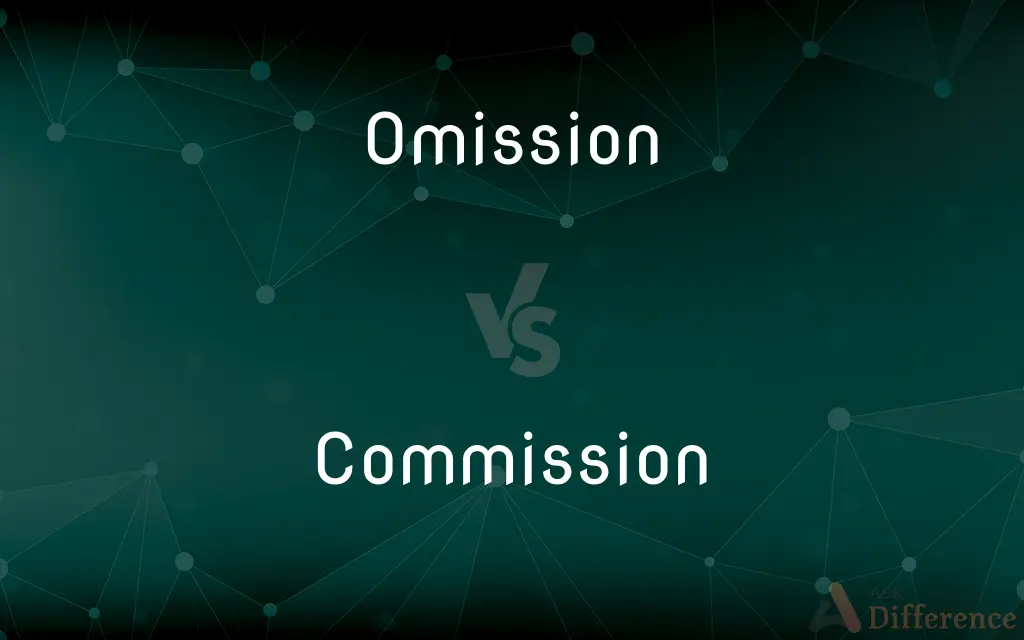Omission vs. Commission — What's the Difference?
By Urooj Arif & Fiza Rafique — Updated on February 29, 2024
Omission refers to the act of leaving something out or failing to include it, while commission involves doing something or carrying out an action, often with specific intent.

Difference Between Omission and Commission
Table of Contents
ADVERTISEMENT
Key Differences
Omission and commission represent two sides of action and inaction, respectively. An omission is the absence of an action, where something that should have been included or done is left out, either intentionally or accidentally. For instance, omitting a key fact from a report can change the perception of the information presented. Commission, on the other hand, is the act of doing something, which can be as simple as executing a task or as complex as committing a deed with significant consequences, like commissioning a work of art or committing a crime.
In legal and ethical contexts, both terms are crucial. An act of omission can be just as significant as one of commission, depending on the circumstances and expectations. For example, failing to provide necessary help can be a serious omission, while actively causing harm would be considered a commission. Both can carry moral or legal responsibility, depending on the duty of care or obligation implied or explicitly stated in the situation.
The distinction between omission and commission is also vital in decision-making processes. Choosing not to act (omission) versus deciding to take an action (commission) can have different implications and outcomes. The former might be seen as a passive decision, while the latter is an active one. Each choice reflects different ethical and practical considerations, such as when a medical professional decides whether or not to administer a treatment.
In terms of culpability and ethics, the concepts of sins of omission and sins of commission highlight the moral weight of actions and inactions. A sin of omission involves failing to do something good that one has a duty to do, while a sin of commission involves actively doing something considered wrong. Both types of sins demonstrate the complexity of moral and ethical judgments, where both what is done and what is not done can be equally significant.
Understanding the difference between omission and commission is essential for comprehending the full scope of human actions and their implications. It informs a nuanced view of responsibility, accountability, and ethical conduct in various spheres of life, including personal relationships, professional duties, and societal norms.
ADVERTISEMENT
Comparison Chart
Definition
The act of leaving something out or not doing
The act of doing something or carrying out an action
Nature
Passive, involves inaction
Active, involves action
Examples
Failing to include important data in a report
Executing a task or committing a deed
Legal/Ethical Implications
Can be significant, especially if there was a duty to act
Involves active decision-making, can lead to direct consequences
Decision-making
Represents a choice not to act
Represents a choice to take an action
Responsibility
Can be held responsible for things not done
Held responsible for actions taken
Ethical Consideration
Sins of omission involve neglecting duties
Sins of commission involve actively doing wrong
Compare with Definitions
Omission
Not including something or neglecting to perform an action.
The omission of her name from the report was an oversight.
Commission
The act of doing something or executing a task.
The artist received a commission to paint a mural.
Omission
Can imply negligence or a breach of duty.
The doctor’s omission to inform the patient could lead to legal repercussions.
Commission
Implies intentionality and action.
His commission of the act was premeditated.
Omission
Evaluated based on duties or obligations neglected.
Not helping in a crisis when capable is a serious omission.
Commission
Involves active participation or execution.
Commission of a crime carries specific legal penalties.
Omission
Often associated with a failure to meet an expectation or requirement.
His omission from the team was controversial.
Commission
Judged based on the actions taken.
His commission of deceit was against company ethics.
Omission
May carry consequences for what was not done.
The omission of safety checks led to the accident.
Commission
Accountability for actions performed.
She took full responsibility for her commission of the project.
Omission
Someone or something that has been left out or excluded
There are glaring omissions in the report
Commission
An instruction, command, or role given to a person or group
One of his first commissions was to redesign the Great Exhibition building
He received a commission to act as an informer
Omission
The act or an instance of omitting.
Commission
A group of people entrusted by a government or other official body with authority to do something
A commission was appointed to investigate allegations of police violence
Omission
The state of having been omitted.
Commission
A sum, typically a set percentage of the value involved, paid to an agent in a commercial transaction
He sold cosmetics on commission
Foreign banks may charge a commission
Omission
Something omitted or neglected.
Commission
The act of granting certain powers or the authority to carry out a particular task or duty.
Omission
(countable) An instance of those acts, or the thing left out thereby; something deleted or left out.
The suspicious omissions in the new edition of the book attracted claims of censorship.
Commission
Often Commission A ruling council within the Mafia that adjudicates family disputes and regulates family activities.
Omission
Something not done or neglected.
The lack of a sponge count was an omission by the surgical team.
Commission
The act of committing (e.g. a crime or error).
The commission, preparation or instigation of an act of terrorism
Omission
The act of omitting; neglect or failure to do something required by propriety or duty.
The most natural division of all offenses is into those of omission and those of commission.
Commission
The act of committing, doing, or performing; the act of perpetrating.
Every commission of sin introduces into the soul a certain degree of hardness.
Omission
That which is omitted or is left undone.
Commission
The duty or employment intrusted to any person or persons; a trust; a charge.
Omission
Something that has been omitted;
She searched the table for omissions
Commission
A company of persons joined in the performance of some duty or the execution of some trust; as, the interstate commerce commission.
A commission was at once appointed to examine into the matter.
Omission
Any process whereby sounds are left out of spoken words or phrases
Commission
To give a commission to; to furnish with a commission; to empower or authorize; as, to commission persons to perform certain acts; to commission an officer.
Omission
Neglecting to do something; leaving out or passing over something
Commission
A fee for services rendered based on a percentage of an amount received or collected or agreed to be paid (as distinguished from a salary);
He works on commission
Commission
The act of granting authority to undertake certain functions
Commission
An official document issued by a government and conferring on the recipient the rank of an officer in the armed forces
Commission
Put into commission; equip for service; of ships
Common Curiosities
What is the main difference between omission and commission?
Omission is the act of leaving something out or not doing something, while commission is the act of doing something or carrying out an action.
Can both omission and commission have legal consequences?
Yes, both can carry legal and ethical consequences depending on the context and the nature of the duty or obligation involved.
How do omission and commission relate to decision-making?
They represent different sides of decision-making: choosing not to act (omission) and deciding to take an action (commission).
Are omissions always unintentional?
No, omissions can be either unintentional or intentional, depending on the circumstances.
Can someone be held responsible for an omission?
Yes, individuals can be held responsible for omissions, especially if there was a duty to act or if their inaction led to negative outcomes.
Is commission always negative?
No, commissions can be positive or negative, such as commissioning art (positive) or committing a crime (negative).
How do ethics apply to omissions and commissions?
Ethical considerations for both involve evaluating the morality of actions taken or not taken, often based on duties, consequences, and intentions.
Can the same action be both an omission and a commission?
An action cannot simultaneously be both, but a scenario can involve elements of both, depending on perspective and context.
How does one assess the severity of omissions and commissions?
The severity is assessed based on the impact, intentions, and responsibilities associated with the act or inaction.
What role does intent play in distinguishing between omission and commission?
Intent is crucial; omissions may lack intent to act, while commissions involve a deliberate decision to act.
Share Your Discovery

Previous Comparison
Click vs. Klick
Next Comparison
Groundhog vs. HedgehogAuthor Spotlight
Written by
Urooj ArifUrooj is a skilled content writer at Ask Difference, known for her exceptional ability to simplify complex topics into engaging and informative content. With a passion for research and a flair for clear, concise writing, she consistently delivers articles that resonate with our diverse audience.
Co-written by
Fiza RafiqueFiza Rafique is a skilled content writer at AskDifference.com, where she meticulously refines and enhances written pieces. Drawing from her vast editorial expertise, Fiza ensures clarity, accuracy, and precision in every article. Passionate about language, she continually seeks to elevate the quality of content for readers worldwide.















































